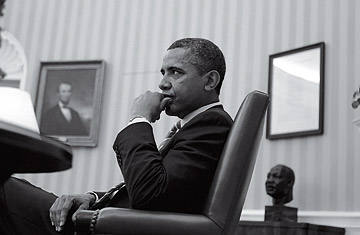
(5 of 7)
A great deal of foreign policy is crisis management. "Stuff happens," the President said, "and you have to respond." Iran's Green movement and the Arab Spring were challenging and unexpected events, and the Obama Administration made a strategic distinction between the two. On Iran, while offering rhetorical support, the White House seemed to have concluded that the regime would be able to suppress the Green movement--which turned out to be an accurate diagnosis. In the cases of Tunisia, Egypt and Libya, the Administration concluded that the democracy protests had become unstoppable and the regimes were doomed. It took Ronald Reagan two years from the beginning of the democracy protests in the Philippines to break with Ferdinand Marcos. In 1997 when protests began in Indonesia, it took Bill Clinton a year to urge President Suharto to resign. In 2011 it took Obama two weeks to urge Hosni Mubarak to leave office. By placing the U.S. on the right side of a historical wave, Obama took it out of the Egyptian political debate. Egyptians know they will succeed or fail at their democratic experiment because of themselves and not Washington. In a Middle East that believes that America conspires and controls all, that's a step forward.
There have been misses. Whatever your view of the Israeli-Palestinian problem, it is difficult to see Obama's approach as a success. The fundamental issue there remains that neither party is inclined toward or capable of making peace right now. Israel is ruled by a right-wing coalition that would collapse if it tried for peace and a Prime Minister who most certainly does not want to. Palestine is divided between two groups, one of which explicitly rejects peace with Israel. In this context, to put American prestige on the line in the hope that a few words or nudges would transform the situation seems naive. It would have been better to have continued with what appeared to be Obama's initial strategy: appoint a special envoy so the world knows that Washington wants a deal--but commit no presidential capital in a situation that seemed destined for stagnation.
One could add others. Relations with Iran could explode as pressure builds (and oil prices rise) without any discernible diplomatic path toward a nuclear deal. The current policy assumes that Iran will capitulate or that, having described the situation in dire terms, the Obama Administration would take even more dramatic steps, perhaps including a military attack on the country. Neither scenario appears likely, and neither side seems to be working to construct a third.
The Asian Opportunity
